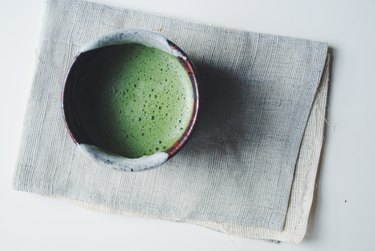
Although green tea can relieve digestive symptoms, you might notice that green tea gives you a stomach ache instead. The culprit could be its caffeine content, or what you are mixing it with.
Tip
If green tea is upsetting your stomach, try a caffeine-free version or leave out the cream.
Video of the Day
Video of the Day
Green Tea and Nausea
Green tea is an infusion of the often slightly withered, unfermented leaves of the Camellia sinensis plant, according to Linus Pauling Institute. The infusion process — basically soaking the tea leaves in hot water — brings out chemicals with potent antioxidant properties that are in the green tea leaves. Green tea also contains other chemicals, including caffeine, that are responsible for its stimulating effects on the body. While many cultures consider green tea to be a vital part of maintaining good health, you may find that drinking it can cause digestive problems.
A common cause of stomach irritation from drinking green tea is its caffeine content. Green tea is not fermented like black tea or oolong tea, so typically it has a lower amount of caffeine, but it can still cause an upset stomach. Caffeine increases the amount of acid in the digestive process, which can cause pain and nausea, particularly if you are sensitive to caffeine or if you take it on an empty stomach. Caffeine can also cause insomnia, headaches, dizziness, dehydration and even increased anxiety, according to MedlinePlus.
Polyphenols and Allergies
In addition to caffeine, the polyphenols present in green tea can also cause the same irritation in the digestive lining. Ironically, while these chemical compounds can be useful in treating and preventing hyperlipidemia, hypertension, atherosclerosis and some types of cancer, according to the Memorial Sloan-Kettering Cancer Center, the polyphenols in green tea leaves include tannins, which are acids that can cause nausea and gastrointestinal distress.
Another possible cause of upset stomach could be the use of dairy products, such as whole milk, in your green tea. Milk contains a sugar called lactose, which many people cannot digest well, according to Mayo Clinic.
In rare instances, an upset stomach can be caused by an allergic reaction to the tea leaves. Allergies, however, are typically accompanied by other symptoms including a swollen mouth or swollen lips, hives or throat closure.
Read more: The Best Green Tea to Lose Weight
Green Tea Stomach Ache Remedy
Drinking green tea only after eating may help reduce the symptoms of an upset stomach because the increased acid production is buffered by the food. Consuming decaffeinated green tea can also help if caffeine is the problem, while drinking tea without dairy products may help if you are lactose-intolerant. Using a substitute, such as a soy-based creamer, might also be of benefit.
If you notice you still have an upset stomach after trying these solutions, an herbal tea without caffeine, tannins or dairy products might also be a viable solution. Stop drinking green tea if you notice signs of an allergic reaction. If the reaction is severe, consult a qualified health practitioner immediately.
According to the National Center for Complementary and Integrative Health, green tea can negatively interact with beta-blockers taken for high blood pressure and other heart issues. Talk to your doctor about possible drug interactions before consuming large amounts of green tea.